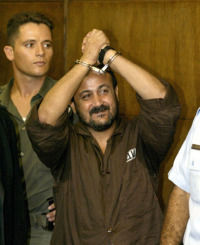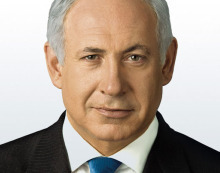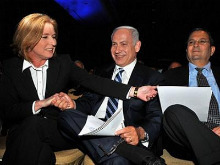Matt Rees's Blog - Posts Tagged "ehud-barak"
The "Palestinian Mandela"?
 Marwan Barghouti, serving five life sentences in an Israeli jail, is a key sticking point in negotiations between Israel and Hamas over kidnapped soldier Gilad Shalit. (I posted this on Global Post.)
Marwan Barghouti, serving five life sentences in an Israeli jail, is a key sticking point in negotiations between Israel and Hamas over kidnapped soldier Gilad Shalit. (I posted this on Global Post.)The most important man in Palestinian politics is neither president nor prime minister. He doesn’t shuttle between meetings at the U.S. ambassador’s residence and the Israeli foreign ministry. In fact, he doesn’t go anywhere. He’s in an Israeli jail.
Marwan Barghouti, 50, is serving five life sentences handed down by an Israeli court for the murders of a number of Israelis and a foreigner between 2000 and 2002. Though Barghouti was a leader of the Fatah faction of the Palestine Liberation Organization, the rival group Hamas is demanding his release in return for the freedom of Gilad Shalit, an Israeli soldier kidnapped and held in the Gaza Strip.
The release of Barghouti, who’s sometimes called “the Palestinian Nelson Mandela,” is a key sticking point in negotiations between Israel and Hamas over Shalit. Israeli officials are prepared to free hundreds of Palestinian prisoners, including many who killed Israelis in terror attacks. But Barghouti is among a coterie of senior Palestinian politicians Israel doesn’t want to give up.
Why is that so important? Because many Palestinians see Barghouti as a leader who can reunite them, at a time when they’re deeply divided — Fatah against Hamas, Gaza against the West Bank, pro-Iranian against pro-U.S.
A fluent Hebrew-speaker, he has a record as favoring the old Oslo peace accords with Israel, while refusing to eschew violence, which he regards as the right of an occupied people. That makes many Palestinians feel he’d lead them toward peace with a firmer hand than their current leadership, which they often see as weak in the face of American pressure and apparent Israeli intransigence.
Could Barghouti do it? Well, this tiny, bustling, barrel-chested charmer had the power to break the Palestinians apart with the second intifada. Perhaps he retains the street cred to do the job in reverse.
Most journalists explain the onset of the intifada’s violence in 2000 with tales of faltering peace talks or “provocative” visits to the Aqsa Mosque compound by then-opposition leader Ariel Sharon. I’d sum it up differently. With two words: Marwan Barghouti.
When Yasser Arafat returned to govern the Palestinians in 1994, he divided his leadership. The “Outside” leaders, who returned from decades in Lebanon and Europe, sewed up all the best jobs in the ministries and the security establishment. With disdain, Palestinians called them “the Tunisians,” after their last place of exile.
The “Inside” leadership, in turn, felt cheated. They had lived through the occupation and been jailed during the tough years of the first intifada, which they, after all, had headed and which had been the point of pressure that led to Israel’s willingness to make a peace deal at all.
Barghouti headed the Inside leaders. Born in Kobar, this small, welcoming village in a glen near Ramallah, he co-founded the Fatah youth movement in his teens, was first arrested by Israel at 18, and was key to the first intifada, which began in 1987. (He was deported to Jordan by the Israelis and coordinated the intifada from there.)
This gave him greater support among ordinary Palestinians, who knew and respected him, as opposed to the unknown or, at best, distant figures of the Outside leadership. Yet, under the Oslo Accords, leaders like Barghouti were stymied. Arafat put Outsiders in control of all the cash, jobs, and favors.
Outside the Palestinian parliament in Ramallah in November 1997, I chatted with Barghouti alone. He made some remarks that I simply scribbled in my notebook and attributed to a combination of bluster, bluff and sour grapes.
“The Inside leadership still feels they don’t have what’s coming to them,” Barghouti told me in his rapid speech. “Former intifada leaders, who were very important, are nothing now. Not one of them is in the leadership of the Authority. The people who lived through the intifada will insist on freedom. As a result, maybe the intifada will be renewed, but maybe this time with more violence.”
In the end, Barghouti became so disenchanted with Arafat’s regime that, when violence broke out in September 2000, he took hold of the uprising and used it to bring the entire Oslo edifice crashing down on Arafat’s regime. His thinking: If Oslo were destroyed, the Outside leaders would lose their power and Arafat would have to turn to Barghouti.
His comments outside the Palestinian parliament came back to me, and in the early days of the intifada I understood why the Israelis and Palestinians had been engulfed in violence that eventually cost thousands of lives: Arafat didn’t handle Barghouti right.
The Israeli prime minister at the start of the intifada, Ehud Barak, understood that. In talks with Arafat just before he was defeated by Sharon in February 2001, Barak demanded that the Palestinian chief rein in Barghouti, who was leading bloody, daily demonstrations at Israeli checkpoints. Barak later said that Arafat turned to his aides, shrugging: “Who does he mean? Who’s he talking about?” said Arafat, who simply didn’t want to discuss his upstart rival, according to Barak.
Barak later described Arafat’s reaction as “bullshit.” It was. Arafat knew Barghouti’s importance better than anyone.
The reason Israeli leaders balk at Hamas’s demand for Barghouti’s release is because they know it, too.
Published on January 13, 2010 06:56
•
Tags:
ehud-barak, fatah, gilad-shalit, intifada, israel, marwan-barghouti, palestinian-politics, palestinians, plo
Bibi's Bedtime Book: The Secret Diary of Prime Minister Netanyahu
 No Palestinian state this week. Don’t really know why not. At this point I’d be happy to sign off on anything at all, just to get it off my hands. I’ve told the Americans that, but they seem convinced I’m some kind of hardliner—they think I’m bluffing when I say “Barry, where do I sign?” I think it’s because of the way I lift my eyebrow in my official photograph. I thought it was sexy and devil-may-care, but apparently it makes me look hawkish and too clever for my own good.
No Palestinian state this week. Don’t really know why not. At this point I’d be happy to sign off on anything at all, just to get it off my hands. I’ve told the Americans that, but they seem convinced I’m some kind of hardliner—they think I’m bluffing when I say “Barry, where do I sign?” I think it’s because of the way I lift my eyebrow in my official photograph. I thought it was sexy and devil-may-care, but apparently it makes me look hawkish and too clever for my own good.It’s been Passover here in Israel. I’ve had to smile and shovel down the usual seasonal foods. I even had to sit through a seder. We were slaves in Egypt, etc., on and on for six hours. You’d have thought we’d be done with all that now. It’s like Zionism never happened.
I gather they had a seder at the White House, too. Without me. Maybe I’ll have Kwanzaa at my villa in Caesarea this year and I pointedly won’t invite Obama. On second thoughts, the rabbis wouldn’t like it. They don’t like holidays where you sing in tune – strictly tuneless, out of time, Jewish mumble-singing is more their thing.
I went down to Shaul’s Shawarma stand to mix with the people. Mofaz insists on meeting there – he set the place up as something to fall back on if he doesn’t get to be Prime Minister instead of me; he could retire, stop wearing his colorless rep ties, and instead bore all his customers with stories of how his political career was a victim of the Ashkenazi establishment. He served me some kind of stinking horsemeat impacted under high pressure into a block so that it looked like an actual cut of meat. I called him “my brother,” which is how Israelis who aren't from the Ashkenazi elite like to refer to each other, and went off to find a breath mint. I suppose he thought the joke was on me.
I’ll eat anything, provided someone else is paying, of course. That’s why I got into politics. Even when I wasn’t in office, at the end of a meal, I’d pat my jacket and say, “Sara, did you bring my wallet?” And some guy from Los Angeles would always reach out and say, “No, no, Mister Prime Minister, let me.”
Why do they say “Mister Prime Minister?” Or Mister President? These are nouns, aren’t they? You don’t call the man who fixes your toilet “Mister Plumber.” On the occasions when I’ve met this Rees fellow I didn’t call him “Mister Writer.” It’s not even necessary for my wife to call me “Mister Big Shot” when she’s upset with me. “Big Shot” would do. I suppose “Mister” adds a grace note to her sarcasm.
Mainly such things are all about self-aggrandizement. Still, just so long as they pick up the tab for my steak and lobster, I’ll let it slide.
Talking of self-aggrandizement, Defense Minister Napoleon puffed out his little chest and humiliated the head of the army this week. Something silly to do with not extending the chief of staff’s term because he didn’t kiss up (figuratively, because in reality everybody would have to bend down to kiss that shortass). Perhaps he’d neglected to call him “Mister Defense Minister.” Or “Mister Bonaparte.” Or “My Emperor.”
Anyway, someone else’s troubles are usually a sign that someone’s too busy elsewhere to ruin my week. So it’s good news. I’ve barely been in the headlines all Passover.
Why am I shy of the press? I keep getting slated for being a hardliner, that’s why. Yet it’s little Napoleon who flattened Gaza and ballsed up the “peace process” a decade ago. I thought we were rid of him once he got onto the $50,000 a night speaking tour in the US. I suppose he had to come back for a while to keep in the public eye, then in a few years he can be President, which isn’t a real job (though I haven’t told Peres that.)
No, I don’t understand the press. Take that fellow Matt Beynon Rees. He came to my office a while back and smoked one of my long Cubans. I told him about my interpretation of the work of Emmanuel Kant, but all he wrote about in the end was a few things I’d said about building in our settlements in Judea and Samaria.
I gather Rees also concluded that journalism is a waste of time. He’s writing fiction now. Crime novels about a Palestinian detective. I must take a look at them. I gather my pal Arafat doesn’t come out too well in one of them called “The Samaritan’s Secret”. A shame. I’m rather fond of the sneaky old “ra’is”, of blessed memory.
Maybe I’ll give it all up and write some fiction myself. About an Israeli Prime Minister who’s misunderstood, who only wants to make people happy and give everyone he talks to exactly what they want. A state for the Palestinians. More ritual baths for the ultra-Orthodox. A free Mazda for the 6 percent of Israelis who don’t already own one. The Legion d’Honneur for the Imperial Defense Minister.
Yes, I might just write a book like that. I think it’d be a good read.
But no one would believe it.
[Prime Minister Netanyahu will be continuing to disclose his most secret thoughts exclusively on this blog].
Published on April 08, 2010 01:12
•
Tags:
barack-obama, benjamin-netanyahu, bibi-s-bedtime-book, crime-fiction, ehud-barak, israel, israeli-politics, israelis, matt-rees, palestine, palestinians, shaul-mofaz, the-samaritan-s-secret
Israeli leaders pass buck
 The present Israeli government seems to make a specialty of dropping the ball. The only thing the top ministers won’t drop is the buck. They’re very adept at passing that.
The present Israeli government seems to make a specialty of dropping the ball. The only thing the top ministers won’t drop is the buck. They’re very adept at passing that.Testimony last week revealed the lack of responsibility at the top of the Israeli government. Before a committee investigating a fouled up military operation, Prime Minister Benjamin Netanyahu and Defense Minister Ehud Barak have both said they take responsibility for the attempted takeover of a Turkish boat May 31 which left nine of the protesters aboard dead. Of course, they immediately added that “taking responsibility” doesn’t mean they were actually “responsible” for what happened.
That was someone else.
Netanyahu said it was Barak’s fault. Barak said it was the army’s fault, and also Netanyahu’s fault. On Aug. 11, the army chief of staff, Gabi Ashkenazi, testified. He said he “takes responsibility” for the operation, and then argued that it wasn’t a failure. In fact he was “proud” of the soldiers who took control of the boat, which was steaming toward Gaza to break the Israeli blockade.
So that’s all cleared up then. Nobody was responsible for the failures of the raid. But the raid was also a good thing. Even if it did result in the broadest international vilification of Israel for some years.
Even the leader of the opposition, Tzipi Livni, says she wants to testify before the committee to “take responsibility” for the Gaza blockade, which was initiated while she was foreign minister in the previous government. The policy is good, she says, but Netanyahu isn’t running it correctly, which makes it look bad. So her taking of responsibility is also just a way of showing that someone else is responsible for the thing no one wants to take responsibility for.
When there’s so much talk of responsibility, it usually means somebody must have done something very irresponsible.
Read the rest of this post on my blog at The Man of Twists and Turns.
Published on August 16, 2010 01:29
•
Tags:
benjamin-netanyahu, ehud-barak, eiland-report, gabi-ashkenazi, gaza, israel, mavi-marmara, middle-east, palestinians, turkish-flotilla, tzipi-livni



